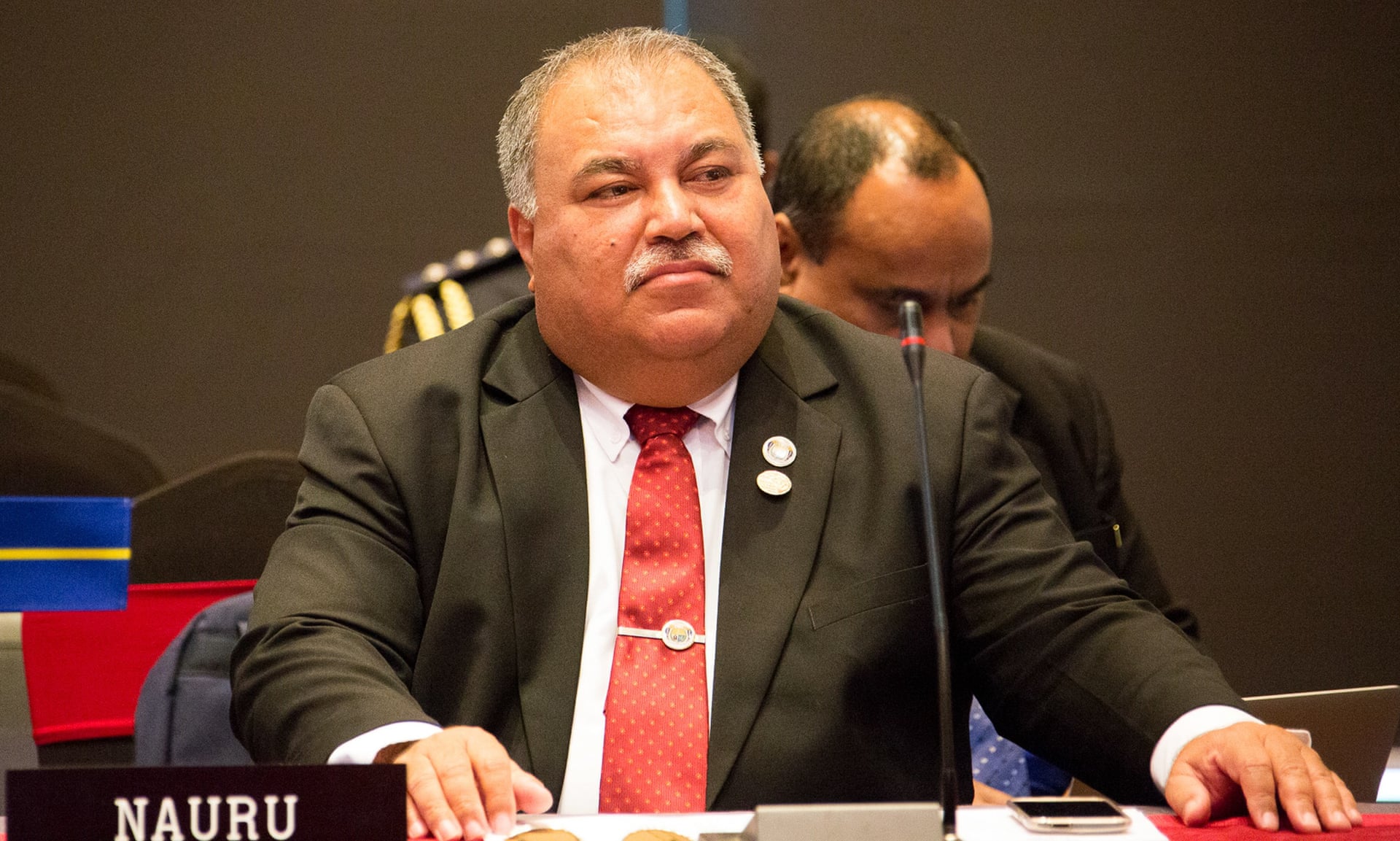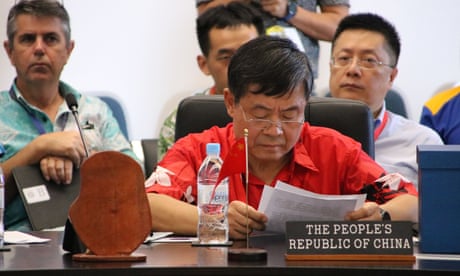
President Tsai Ing-wen of Taiwan, center, during a visit to a Taiwanese military base in January. At the end of her trip to the South Pacific, Ms. Tsai will make a stop in Hawaii on her way back to Taiwan.
TAIPEI, Taiwan — Taiwan’s president, Tsai Ing-wen, will travel to the South Pacific on Thursday to shore up ties with three island nations that still recognize Taiwan as a country, in an effort to offset China’s expanding influence in the region.
Only 17 countries recognize Taiwan’s government, and among those, Ms. Tsai will be visiting Palau, Nauru and the Marshall Islands.
China has been pouring aid and investment into the Pacific islands, raising the question of whether Beijing could strip Taiwan of more of its few remaining diplomatic allies and shrink the self-ruled island’s international presence.
The Trump administration has sought to push back against China’s reach in the South Pacific and Latin America.
Australia is also concerned, and last year set aside more money in its budget for Pacific aid.
For the small, developing countries that still recognize Taiwan, the primary reason to consider switching recognition to Beijing from Taipei is the aid and investment that China offers.
For the small, developing countries that still recognize Taiwan, the primary reason to consider switching recognition to Beijing from Taipei is the aid and investment that China offers.
But potential economic benefits may come at a cost, officials and analysts in Taiwan and the United States have warned.
“Growing Chinese economic influence over time may be translated into political and strategic influence,” said Bonnie Glaser, director of the China Power Project at the Center for Strategic and International Studies.
“Growing Chinese economic influence over time may be translated into political and strategic influence,” said Bonnie Glaser, director of the China Power Project at the Center for Strategic and International Studies.
Commercial investment in a port, for example, could lead to military access, she said.
“This is especially of concern in Latin America, a region that the U.S. has long considered its backyard.”
United States diplomats have argued to Taiwan’s allies that relying too heavily on China is risky, Ms. Glaser said.
United States diplomats have argued to Taiwan’s allies that relying too heavily on China is risky, Ms. Glaser said.
They have provided data about debt traps China has created elsewhere, she added.
The spokesman for Taiwan’s presidential office, Chang Tun-han, would not confirm if aid or investment packages would be announced during Ms. Tsai’s eight-day trip.
The spokesman for Taiwan’s presidential office, Chang Tun-han, would not confirm if aid or investment packages would be announced during Ms. Tsai’s eight-day trip.
Ross Feingold, a political analyst in Taipei, Taiwan’s capital, said that with elections coming up in Nauru and the Marshall Islands this year, Ms. Tsai was very likely to pledge assistance of some kind.

Taiwan’s foreign minister, Joseph Wu, says China is using its state-owned construction and engineering companies to approach governments in Latin America about switching recognition to China from Taiwan.

Taiwan’s foreign minister, Joseph Wu, says China is using its state-owned construction and engineering companies to approach governments in Latin America about switching recognition to China from Taiwan.
Ms. Tsai will make a stop in Hawaii on her way back next Wednesday — a transit that could annoy Beijing.
The United States shifted to recognizing China’s Communist government in 1979, but still maintains unofficial relations with Taipei.
China considers Taiwan to be part of its territory and has long sought to reduce the number of countries that recognize it.
China considers Taiwan to be part of its territory and has long sought to reduce the number of countries that recognize it.
Since Ms. Tsai came to power in 2016, Beijing has poached five of Taiwan’s diplomatic allies.
China has also stepped up pressure on the island democracy by increasing its military activities near Taiwanese waters and airspace.
For Taiwan’s government, the 17 countries that still officially recognize it are of symbolic importance because they support Taiwan’s claim to statehood.
For Taiwan’s government, the 17 countries that still officially recognize it are of symbolic importance because they support Taiwan’s claim to statehood.
The most immediate questions hang over two Pacific island nations that Ms. Tsai will not be visiting — Kiribati and the Solomon Islands.
According to Taiwanese news reports, she had initially planned to visit Kiribati on this trip, but the stop was called off because of what officials said were scheduling conflicts.
According to Taiwanese news reports, she had initially planned to visit Kiribati on this trip, but the stop was called off because of what officials said were scheduling conflicts.
Last May, initial plans for a visit by Ms. Tsai to Burkina Faso were similarly shelved shortly before the country severed ties with Taipei.
Rick Hou, the prime minister of the Solomon Islands, has said he will review the relationship with Taiwan if he is re-elected this year.
Rick Hou, the prime minister of the Solomon Islands, has said he will review the relationship with Taiwan if he is re-elected this year.
China has become a major export destination for the Solomon Islands in recent years, primarily driven by unsustainable logging of the country’s rain forests.
China is aggressively pumping money into the South Pacific via Xi Jinping’s Belt and Road Initiative, said Karl Eikenberry, director of the U.S.-Asia Security Initiative at the Shorenstein Asia-Pacific Research Center.
China is aggressively pumping money into the South Pacific via Xi Jinping’s Belt and Road Initiative, said Karl Eikenberry, director of the U.S.-Asia Security Initiative at the Shorenstein Asia-Pacific Research Center.
The Chinese initiative is a sweeping plan for infrastructure investment to more closely link China with Asia, Africa and Europe.
“A lot of the money that they’re investing isn’t transparent,” Mr. Eikenberry said at a news conference at Taiwan’s Institute for National Defense and Security Research on Tuesday.
“A lot of the money that they’re investing isn’t transparent,” Mr. Eikenberry said at a news conference at Taiwan’s Institute for National Defense and Security Research on Tuesday.
“It’s corrupting political systems.”
“Do they see strategic utility in having a presence in those Pacific island nations?” he said.
“Do they see strategic utility in having a presence in those Pacific island nations?” he said.
“The answer is yes.”
Late last month, Secretary of State Mike Pompeo spoke at a gathering of South Pacific nations, including the leaders of the Marshall Islands, Kiribati and Palau, praising the countries for their recognition of Taiwan.

Soldiers hoisting the national flag at Liberty Square in Taipei, Taiwan’s capital. China considers Taiwan to be part of its territory and has long sought to reduce the number of countries that recognize it.
Late last month, Secretary of State Mike Pompeo spoke at a gathering of South Pacific nations, including the leaders of the Marshall Islands, Kiribati and Palau, praising the countries for their recognition of Taiwan.

Soldiers hoisting the national flag at Liberty Square in Taipei, Taiwan’s capital. China considers Taiwan to be part of its territory and has long sought to reduce the number of countries that recognize it.
“We respect and support the decision those of you have made to continue to support Taiwan,” Mr. Pompeo said.
Latin America is also a source of worry for Taiwan.
Taiwan’s foreign minister, Joseph Wu, told journalists last week that China is using its large state-owned construction and engineering companies to approach governments of Taipei’s diplomatic allies in Latin America about switching recognition to Beijing.
“All these countries that are not able to finance the projects themselves need to get loans from China — that’s debt-trap diplomacy,” Mr. Wu said.
Mr. Wu cited as examples Panama and El Salvador, which normalized relations with China in June 2017 and August of last year, respectively.
The Trump administration has stepped into the diplomatic tug-of-war.
In September, the State Department recalled its top diplomats from the two countries, as well as the Dominican Republic, which dropped Taiwan for China last May.
El Salvador’s ties with China have become a question.
El Salvador’s ties with China have become a question.
Nayib Bukele, the new president-elect, said after a speech at the Heritage Foundation in Washington this month that he was reviewing his country’s relations with Beijing, suggesting that reverting to recognition of Taiwan was a possibility.
Before Mr. Bukele was elected last month, his predecessor, Salvador Sánchez Cerén, met with Xi Jinping and secured $150 million in aid from China for 13 projects, the details of which were not made public.
Mr. Bukele said Beijing was selling projects to countries that cannot repay the loans that come attached to them.
Before Mr. Bukele was elected last month, his predecessor, Salvador Sánchez Cerén, met with Xi Jinping and secured $150 million in aid from China for 13 projects, the details of which were not made public.
Mr. Bukele said Beijing was selling projects to countries that cannot repay the loans that come attached to them.
“They go in, they do projects that are not feasible, then they leave the countries with huge loans they cannot repay and they use as a kind of leverage.”
John Bolton, President Trump’s national security adviser, met with Mr. Bukele during his visit and said the United States would work with Mr. Bekele to “counter Chinese predatory practices.”
John Bolton, President Trump’s national security adviser, met with Mr. Bukele during his visit and said the United States would work with Mr. Bekele to “counter Chinese predatory practices.”

